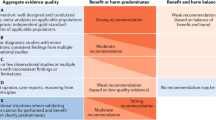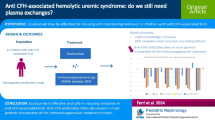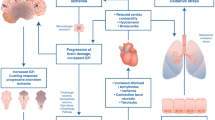Abstract
We report the use of an autosomal-dominant polycystic kidney disease (ADPKD) donor kidney in a paediatric recipient. A 14-year-old boy on haemodialysis for 4 years following loss of a first kidney transplant, highly sensitised, and with limited vascular options for ongoing dialysis access, was offered a deceased brain death donor transplant from a mid-30s donor with known ADPKD but normal kidney function and negligible proteinuria. After extensive discussion with the patient and family, discussing all alternative options and review of available literature, the kidney was accepted and implanted. Graft function was immediate. An early post-transplant creatinine rise was attributed to possible antibody-mediated rejection, treated with plasmapheresis and rituximab. Ten months post-transplant, the patient remains dialysis-free with stable function. Extended criteria kidneys are already considered for highly sensitised or long-waiting dialysis patients. Though the literature is limited, kidneys from patients with ADPKD could be considered within extended criteria offers on a case-by-case basis.

Similar content being viewed by others
References
Shamali A, Milsom-Mcquillan S, Gibbs P (2018) Outcomes of renal transplant from donors with polycystic kidney disease. Int J Surg 51:229–232. https://doi.org/10.1016/j.ijsu.2018.01.049
NHS (2023) Annual report on kidney transplantation. https://nhsbtdbe.blob.core.windows.net/umbraco-assets-corp/30877/nhsbt-kidney-transplantation-report-2223.pdf. Accessed 8 October 2023
Patel K, Brotherton A, Chaudry D, Evison F, Nieto T, Dabare D, Sharif A (2023) All expanded criteria donor kidneys are equal but are some more equal than others: a population-cohort analysis of UK Transplant Registry data. Transpl Int 36:11421. https://doi.org/10.3389/ti.2023.11421
Issa N, Chedid M, Irazabal MV, Dean PG, Chebib FT (2021) Twenty-year survival of kidney transplant from a deceased donor with autosomal dominant polycystic kidney disease. Kidney Int Rep 6:2240–2242. https://doi.org/10.1016/j.ekir.2021.05.030
Eng MK, Zorn KC, Harland RC, Bernstein AJ, Katz M, Shikanov S et al (2008) Fifteen-year follow-up of transplantation of a cadaveric polycystic kidney: a case report. Transplant Proc 40:1747–1750. https://doi.org/10.1016/j.transproceed.2008.01.065
Author information
Authors and Affiliations
Corresponding author
Ethics declarations
Conflict of interest
The authors declare no competing interests.
Additional information
Publisher’s Note
Springer Nature remains neutral with regard to jurisdictional claims in published maps and institutional affiliations.
Rights and permissions
Springer Nature or its licensor (e.g. a society or other partner) holds exclusive rights to this article under a publishing agreement with the author(s) or other rightsholder(s); author self-archiving of the accepted manuscript version of this article is solely governed by the terms of such publishing agreement and applicable law.
About this article
Cite this article
Peltz, T., Shumeyko, V. & Reynolds, B. Use of a donor kidney with known autosomal dominant polycystic kidney disease in a highly sensitised paediatric recipient. Pediatr Nephrol 39, 1775–1777 (2024). https://doi.org/10.1007/s00467-024-06283-y
Received:
Revised:
Accepted:
Published:
Issue Date:
DOI: https://doi.org/10.1007/s00467-024-06283-y




